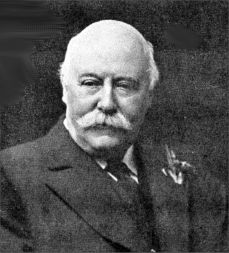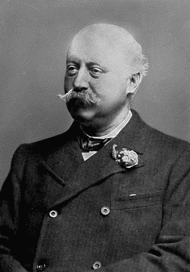<Back to Index>
- Physicist Yulii Borisovich Khariton, 1904
- Composer Charles Hubert Hastings Parry, 1848
- General of the Spanish Army Joaquín Baldomero Fernández - Espartero y Alvarez de Toro, 1793
PAGE SPONSOR


Sir Charles Hubert Hastings Parry, 1st Baronet (27 February 1848 – 7 October 1918) was an English composer, teacher and historian of music.
Parry's first major works appeared in 1880. As a composer he is best known for the choral song "Jerusalem", the coronation anthem "I was glad" and the hymn tune "Repton", which sets the words "Dear Lord and Father of Mankind". He was director of the Royal College of Music from 1895 until his death and was also professor of music at the University of Oxford from
1900 to 1908. He also wrote several books about music and music
history. Some contemporaries rated him as the finest English composer since Henry Purcell, but his academic duties prevented him from devoting all his energies to composition.
Parry was born in Bournemouth, the youngest of six children of Thomas Gambier Parry (1816 – 1888) of Highnam Court, Gloucestershire, a painter, art collector and inventor of the "spirit fresco" process, and his first wife, Isabella née Clinton (1816 – 1848). Three of their children died in infancy, and Isabella Parry died twelve days after the birth of her sixth child. Parry grew up at Highnam Court with his surviving siblings, (Charles) Clinton and Lucy. Thomas Parry remarried in 1851, and had a further six children.
From this upper middle class background, Parry was sent to Twyford Preparatory School in Hampshire and Eton, where his interest in music was encouraged and developed. At Eton he distinguished himself at sports as well as music, despite early signs of the heart trouble that was to dog him for the rest of his life. He took music lessons with Sir George Job Elvey, the organist of St George's Chapel, Windsor, and composed many prentice works.
While still at Eton Parry successfully sat the Oxford Bachelor of Music examination, the youngest person who had ever done so. His examination exercise, a cantata, O Lord, Thou hast cast us out, "astonished" the Oxford Professor of Music, Sir Frederick Ouseley, and was triumphantly performed and published in 1867. On
going on to Oxford after leaving Eton, Parry did not study music, being
intended by his father for a commercial career, and instead read law
and modern history. From 1870 to 1877 he was an underwriter at Lloyd's of London. In 1872 he married Lady Elizabeth Maude Herbert (1851 – 1933), second daughter of the politician Sidney Herbert and his wife Elizabeth.
His in-laws, like his father, preferred a conventional career for him,
although Parry proved as unsuccessful in insurance as he was successful
in music. Parry and his wife had two daughters, Their elder, Dorothea (d. 11 July 1963) married the politician Arthur Ponsonby in 1898 and had a son and a daughter. Their younger daughter Gwendolen (b. 1877) married the baritone Harry Plunket Greene (1865 – 1936) and had two sons and a daughter.
Parry continued his musical studies alongside his work in insurance. He had already studied with the English born composer Henry Hugo Pierson in Stuttgart, and on moving to London he took lessons from William Sterndale Bennett, but finding them insufficiently demanding he sought lessons from Johannes Brahms. Brahms was not available, and Parry was recommended to the pianist Edward Dannreuther, "wisest and most sympathetic of teachers". Dannreuther started by giving Parry piano lessons, but soon extended their studies to analysis and composition. At this stage in his musical development, Parry moved away from the classical conventions inspired by Mendelssohn. Dannreuther introduced him to the music of Wagner, which influenced his compositions of these years.
At the same time as his compositions were coming to public notice, Parry was taken up as a musical scholar by George Grove, first as his assistant editor for his new Dictionary of Music and Musicians, to which post Parry was appointed in 1875 and contributed 123 articles, and then, in 1883, Grove, as the first director of the new Royal College of Music, appointed him as the college's professor of composition and musical history.
Parry's first major works appeared in 1880: a piano concerto, which Dannreuther premiered, and a choral setting of scenes from Shelley's Prometheus Unbound.
The first performance of the latter has often been held to mark the
start of a "renaissance" in English classical music, but was regarded
by many critics as too avant garde. Parry scored a greater contemporary success with the ode Blest Pair of Sirens (1887), commissioned by and dedicated to Charles Villiers Stanford,
one of the first British musicians to recognise Parry's talent.
Stanford described Parry as the greatest English composer since Purcell. Blest Pair of Sirens, a setting of Milton's "At a Solemn Musick",
suggested as a text by Grove, established Parry as the leading English
choral composer of his day; this had the drawback of bringing him a
series of commissions for conventional oratorios, a genre with which he
was not in sympathy.
Now well established as a composer and scholar, Parry received many commissions. Among them were choral works such as the Ode on Saint Cecilia's Day (1889), the oratorios Judith (1888) and Job (1892), the psalm setting De Profundis (1891) and a lighter work, The Pied Piper of Hamelin (1905), described later as "a bubbling well of humour." The biblical oratorios were well received by the public, but Parry's lack of sympathy with the form was mocked by George Bernard Shaw, then writing musical criticism in London. He denounced Job as "the most utter failure ever achieved by a thoroughly respectworthy musician. There is not one bar in it that comes within fifty thousand miles of the tamest line in the poem."
Contemporary critics generally regarded Parry's orchestral music as of secondary importance in his output, but in the late twentieth and early twenty - first centuries many of Parry's orchestral pieces have been revived. These include five symphonies, a set of Symphonic Variations in E minor, the Overture to an Unwritten Tragedy (1893) and the Elegy for Brahms (1897). In 1883 Parry wrote music to accompany the Cambridge Greek Play The Birds by Aristophanes, a production which starred the mediaevalist and ghost story writer, M.R. James. Parry received an honorary degree from Cambridge University in the same year. Subsequently, he wrote music for Oxford productions of Aristophanes: The Frogs (1892), The Clouds (1905) and The Acharnians (1914). He had also provided elaborate incidental music for a West End production by Beerbohm Tree Hypatia (1893). In contrast to this involvement with music for the theatre, his only attempt at opera, Guenever was turned down by the Carl Rosa Opera Company.
When Grove retired as director of the Royal College of Music, Parry succeeded him from January 1895, and held the post until his death. In 1900 he succeeded John Stainer as professor of music at Oxford. An obituarist in 1918 lamented these calls on Parry's time: "A composer who counts is rare enough anywhere, any time. Do not try to use him as a mixture of university don, cabinet minister, city magnate, useful hack, or a dozen things besides. A great blow was delivered against English music when Parry was appointed to succeed Sir George Grove as director of the RCM." Despite the demands of these posts his personal beliefs, which were Darwinian and humanist, led him to compose a series of six "ethical cantatas", experimental works in which he hoped to supersede the traditional oratorio and cantata forms. They were generally unsuccessful with the public, though Elgar admired The Vision of Life (1907), and The Soul's Ransom (1906) has had several modern performances.
Influenced as a composer principally by Bach and Brahms, Parry evolved a powerful diatonic style which itself greatly influenced future English composers such as Elgar and Vaughan Williams. His own full development as a composer was almost certainly hampered by the immense amount of work he took on; but his energy and charisma, not to mention his abilities as a teacher and administrator, helped establish art music at the centre of English cultural life. As head of the Royal College of Music, he numbered among his leading pupils Ralph Vaughan Williams, Gustav Holst, Frank Bridge and John Ireland.
Parry was created a Knight Bachelor in 1898. He was made a baronet in 1902. The baronetcy became extinct on his death.
Parry wrote about music throughout his adult life. As well as his 123 articles in Grove's Dictionary, his publications include
Studies of Great Composers (1886); The Art of Music (1893) enlarged as The Evolution of the Art of Music (1896); The Music of the Seventeenth Century, (Volume III of the Oxford History of Music (1902); Johann Sebastian Bach: the Story of the Development of a Great Personality (1909); and Style in Musical Art, collected Oxford lectures (1911).
Parry resigned his Oxford appointment on doctor's advice in 1908 and in the last decade of his life produced some of his best known works, including the Symphonic Fantasia '1912' (also called Symphony No. 5), the Ode on the Nativity (1912), Jerusalem (1916) and the Songs of Farewell (1916 – 1918). The piece by which he is best known, the setting of William Blake's poem "Jerusalem" mentioned above, was immediately taken up by the suffragette movement, with which both Parry and his wife were strongly in sympathy.
Parry held German music and its traditions to be the pinnacle of music, and was a friend of German culture in general. He was, accordingly, certain that Britain and Germany would never go to war against each other, and was in despair when World War I broke out. In the words of the Oxford Dictionary of National Biography: "During the war he watched a life's work of progress and education being wiped away as the male population — particularly the new fertile generation of composing talent — of the Royal College dwindled."
In the autumn of 1918 Parry contracted Spanish flu during the infamous global pandemic and died at Knightscroft, Rustington, West Sussex, aged 70. At the suggestion of Stanford he was buried in St Paul's Cathedral. The site of his birthplace in Richmond Hill, Bournemouth, next door to The Square is marked with a blue plaque, and there is a memorial tablet, with an inscription by Bridges, in Gloucester Cathedral, unveiled during the Three Choirs Festival of 1922.